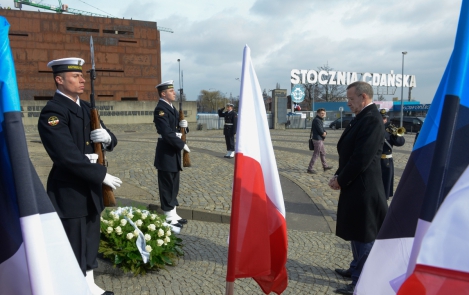-
Reset
+


President Ilves commemorated the people who died for freedom in Gdansk and paid a visit to Polonia student fraternity
Thursday, 20 March 2014 17:24
The President, Toomas Hendrik Ilves, and Evelin Ilves, who are on a state visit to Poland, placed a wreath today in Gdansk – "birthplace of solidarity" – at the memorial to the workers who were killed in the uprising of 1970. The Estonian Head of State also visited "The Road to Freedom" exhibition, which details the resistance to totalitarian communist regimes in Europe.
"For 100 million people, Gdansk stands for the yearning for freedom and a road to democracy," told President Ilves.
He recalled that the Polish who fought for their freedom in the 1970s and 1980s remained largely alone as "many in Europe did not want to rock the boat".
"Today, we represent those in Europe who are willing "to rock the boat" for the sake of freedom and shared values," confirmed the Estonian Head of State. "The price of lost freedom is higher than a thousand cubic metres of gas".
The Minister of Culture, Urve Tiidus, gave a wooden suitcase to the Second World War Museum, made in a Gulag labour camp in Mordovia, which was used by one of the people deported from Estonia when he returned home.
In Sopot, President Ilves paid a visit to a convent of the Polonia student fraternity. Korporacja Akademicka Konwent Polonia was established by Polish students back in 1828 in Tartu and is the oldest active fraternity in Poland. In 1919, they transferred their activities to Vilnius and continued there until 1939; later the fraternity existed in exile, mostly in London, and from 1998 in Gdansk.
Polonia is twinned with the Estonian student fraternity Korp! Fraternitas Estica.
In the University of Tartu, the great-great grandfather of President Komorowski, Piotr Komorowski, along with his brothers, Antoni and Wiktor, and their nephew, Jan Komorowski, became members of Polonia.
Several thousands Polish students studied in the University of Tartu between 1802 and 1918; their numbers in the only German language university in the Russian Empire surged after the universities in Warsaw and Vilnius were closed in 1830-1831 following the uprising in Poland. Students came to Tartu from both the Kingdom of Poland and the western provinces of Russia – Lithuania, Belarus and Right-bank Ukraine. The reopening of the University of Warsaw in 1857-1862 resulted in a decrease in the number of Polish students, which started to grow again in 1869-1870 after the Russification of the University of Warsaw. Polish students also continued their studies in the University of Tartu after the Russification of the university at the beginning of the 1890s. One of the students subsequently became the first President of the Polish government in exile, Władysław Raczkiewicz, who graduated from the Faculty of Law of the University of Tartu in 1911. The students of religious studies formed a separate group among the Polish students, mostly Catholics, who later became pastors of Polish and Lithuanian protestant congregations.
President Ilves also visited Gdansk Science and Technology Park, which brings together more than one hundred innovative companies.
Office of the President
Public Relations Department
Phone +372 631 6229




